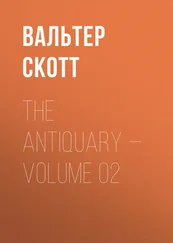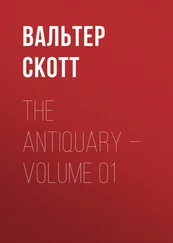Вальтер Скотт - Waverley Novels — Volume 12
Здесь есть возможность читать онлайн «Вальтер Скотт - Waverley Novels — Volume 12» — ознакомительный отрывок электронной книги совершенно бесплатно, а после прочтения отрывка купить полную версию. В некоторых случаях можно слушать аудио, скачать через торрент в формате fb2 и присутствует краткое содержание. Жанр: foreign_antique, foreign_prose, Альтернативная история, на английском языке. Описание произведения, (предисловие) а так же отзывы посетителей доступны на портале библиотеки ЛибКат.
- Название:Waverley Novels — Volume 12
- Автор:
- Жанр:
- Год:неизвестен
- ISBN:нет данных
- Рейтинг книги:5 / 5. Голосов: 1
-
Избранное:Добавить в избранное
- Отзывы:
-
Ваша оценка:
- 100
- 1
- 2
- 3
- 4
- 5
Waverley Novels — Volume 12: краткое содержание, описание и аннотация
Предлагаем к чтению аннотацию, описание, краткое содержание или предисловие (зависит от того, что написал сам автор книги «Waverley Novels — Volume 12»). Если вы не нашли необходимую информацию о книге — напишите в комментариях, мы постараемся отыскать её.
Waverley Novels — Volume 12 — читать онлайн ознакомительный отрывок
Ниже представлен текст книги, разбитый по страницам. Система сохранения места последней прочитанной страницы, позволяет с удобством читать онлайн бесплатно книгу «Waverley Novels — Volume 12», без необходимости каждый раз заново искать на чём Вы остановились. Поставьте закладку, и сможете в любой момент перейти на страницу, на которой закончили чтение.
Интервал:
Закладка:
Though fearful, and almost despairing of being able to manage the rude and discordant army of haughty chiefs, who were wholly independent of each other, Alexius failed not, with eagerness and dexterity, to seize upon the admission of Godfrey and his compeers, that the Emperor was entitled to the allegiance of all who should war on Palestine, and natural lord paramount of all the conquests which should be made in the course of the expedition. He was resolved to make this ceremony so public, and to interest men's minds in it by such a display of the imperial pomp and munificence, that it should not either pass unknown, or be readily forgotten.
An extensive terrace, one of the numerous spaces which extend along the coast of the Propontis, was chosen for the site of the magnificent ceremony. Here was placed an elevated and august throne, calculated for the use of the Emperor alone. On this occasion, by suffering no other seats within view of the pageant, the Greeks endeavoured to secure a point of ceremony peculiarly dear to their vanity, namely, that none of that presence, save the Emperor himself, should be seated. Around the throne of Alexius Comnenus were placed in order, but standing, the various dignitaries of his splendid court, in their different ranks, from the Protosebastos and the Caesar, to the Patriarch, splendid in his ecclesiastical robes, and to Agelastes, who, in his simple habit, gave also the necessary attendance. Behind and around the splendid display of the Emperor's court, were drawn many dark circles of the exiled Anglo-Saxons. These, by their own desire, were not, on that memorable day, accoutred in the silver corslets which were the fashion of an idle court, but sheathed in mail and plate. They desired, they said, to be known as warriors to warriors. This was the more readily granted, as there was no knowing what trifle might infringe a truce between parties so inflammable as were now assembled.
Beyond the Varangians, in much greater numbers, were drawn up the bands of Grecians, or Romans, then known by the title of Immortals, which had been borrowed by the Romans originally from the empire of Persia. The stately forms, lofty crests, and splendid apparel of these guards, would have given the foreign princes present a higher idea of their military prowess, had there not occurred in their ranks a frequent indication of loquacity and of motion, forming a strong contrast to the steady composure and death-like silence with which the well-trained Varangians stood in the parade, like statues made of iron.
The reader must then conceive this throne in all the pomp of Oriental greatness, surrounded by the foreign and Roman troops of the empire, and closed on the rear by clouds of light-horse, who shifted their places repeatedly, so as to convey an idea of their multitude, without affording the exact means of estimating it. Through the dust which they raised by these evolutions, might be seen banners and standards, among which could be discovered by glances, the celebrated LABARUM, [Footnote: Ducange fills half a column of his huge page with the mere names of the authors who have written at length on the Labarum , or principal standard of the empire for the time of Constantine. It consisted of a spear of silver, or plated with that metal, having suspended from, a cross beam below the spoke a small square silken banner, adorned with portraits of the reigning family, and over these the famous Monogram which expresses at once the figure of the cross and the initial letters of the name of Christ. The bearer of the Labarum was an officer of high rank down to the last days of the Byzantine government. — See Gibbon, chap. 20.
Ducange seems to have proved, from the evidence of coins and triumphial monuments, that a standard of the form of the Labarum was used by various barbarous nations long before it was adopted by their Roman conquerors, and he is of opinion that its name also was borrowed from either Teutonic Germany, or Celtic Gaul, or Sclavonic Illyria. It is certain that either the German language or the Welsh may afford at this day a perfectly satisfactory etymon: Lap-heer in the former and Lab-hair in the latter, having precisely the same meaning — the cloth of the host .
The form of the Labarum may still be recognised in the banners carried in ecclesiastical processions in all Roman Catholic countries.] the pledge of conquest to the imperial banners, but whose sacred efficacy had somewhat failed of late days. The rude soldiers of the West, who viewed the Grecian army, maintained that the standards which were exhibited in front of their line, were at least sufficient for the array of ten times the number of soldiers.
Far on the right, the appearance of a very large body of European cavalry drawn up on the sea-shore, intimated the presence of the crusaders. So great was the desire to follow the example of the chief Princes, Dukes, and Counts, in making the proposed fealty, that the number of independent knights and nobles who were to perform this service, seemed very great when collected together for that purpose; for every crusader who possessed a tower, and led six lances, would have thought himself abridged of his dignity if he had not been called to acknowledge the Grecian Emperor, and hold the lands he should conquer of his throne, as well as Godfrey of Bouillon, or Hugh the Great, Count of Vermandois. And yet, with strange inconsistency, though they pressed to fulfil the homage, as that which was paid by greater persons than themselves, they seemed, at the very same time, desirous to find some mode of intimating that the homage which they rendered they felt as an idle degradation, and in fact held the whole show as a mere piece of mockery.
The order of the procession had been thus settled: — The Crusaders, or, as the Grecians called them, the Counts , — that being the most common title among them, — were to advance from the left of their body, and passing the Emperor one by one, were apprized, that, in passing, each was to render to him, in as few words as possible, the homage which had been previously agreed on. Godfrey of Bouillon, his brother Baldwin, Bohemond of Antioch, and several other crusaders of eminence, were the first to perform the ceremony, alighting when their own part was performed, and remaining in attendance by the Emperor's chair, to prevent, by the awe of their presence, any of their numerous associates from being guilty of petulance or presumption during the solemnity. Other crusaders of less degree retained their station near the Emperor, when they had once gained it, out of mere curiosity, or to show that they were as much at liberty to do so as the greater commanders who assumed that privilege.
Thus two great bodies of troops, Grecian and European, paused at some distance from each other on the banks of the Bosphorus canal, differing in language, arms, and appearance. The small troops of horse which from time to time issued forth from these bodies, resembled the flashes of lightning passing from one thunder-cloud to another, which communicate to each other by such emissaries their overcharged contents. After some halt on the margin of the Bosphorus, the Franks who had performed homage, straggled irregularly forward to a quay on the shore, where innumerable galleys and smaller vessels, provided for the purpose, lay with sails and oars prepared to waft the warlike pilgrims across the passage, and place them on that Asia which they longed so passionately to visit, and from which but few of them were likely to return. The gay appearance of the vessels which were to receive them, the readiness with which they were supplied with refreshments, the narrowness of the strait they had to cross, the near approach of that active service which they had vowed and longed to discharge, put the warriors into gay spirits, and songs and music bore chorus to the departing oars.
Читать дальшеИнтервал:
Закладка:
Похожие книги на «Waverley Novels — Volume 12»
Представляем Вашему вниманию похожие книги на «Waverley Novels — Volume 12» списком для выбора. Мы отобрали схожую по названию и смыслу литературу в надежде предоставить читателям больше вариантов отыскать новые, интересные, ещё непрочитанные произведения.
Обсуждение, отзывы о книге «Waverley Novels — Volume 12» и просто собственные мнения читателей. Оставьте ваши комментарии, напишите, что Вы думаете о произведении, его смысле или главных героях. Укажите что конкретно понравилось, а что нет, и почему Вы так считаете.












